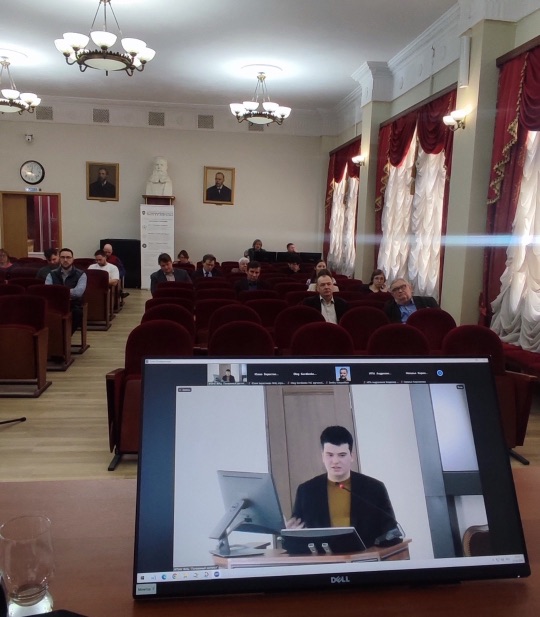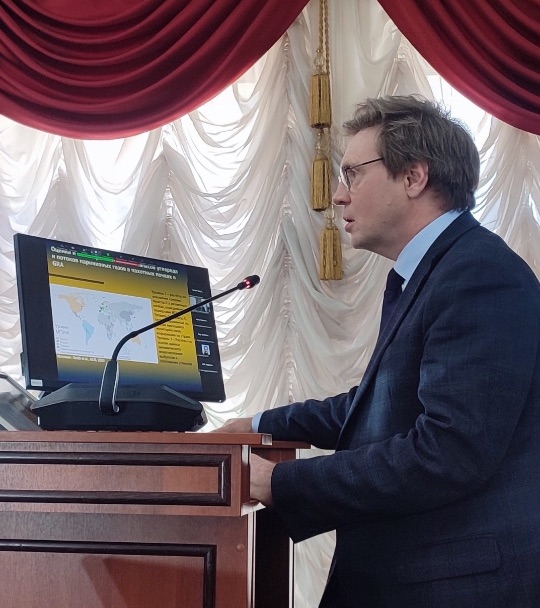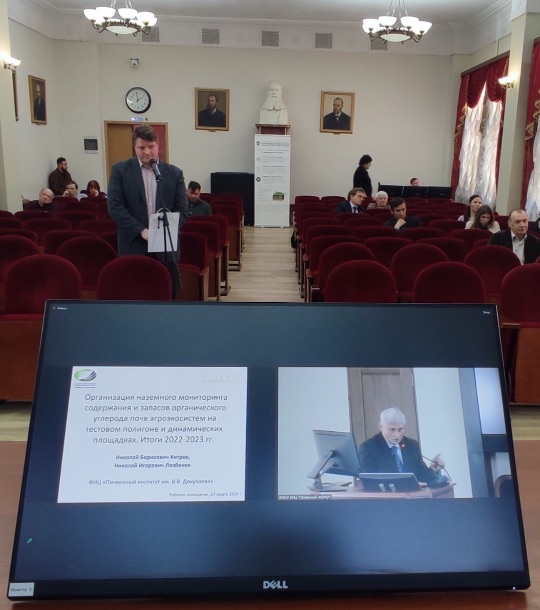
The working meeting of the performers of the KIP NI "Unified National Monitoring System for Climate-Active Substances" on the topic "Ground-based monitoring of carbon pools in agroecosystems of the Russian Federation" took place on March 27, 2024 at the Dokuchaev Soil Science Institute.
The meeting was devoted to discussing the sources of uncertainty in existing assessments of the agricultural land use contribution to the greenhouse gas balance of the Russian Federation, issues related to the scientific and methodological support for its calculations, and the improvement of regulatory and organizational forms for collecting industry reporting.
In her opening remarks, Natalya Vasilyevna Lukina, the head of Consortium KIP NI No. 4 - REC "Carbon in Ecosystems: Monitoring," director of the Center for Environmental and Productive Land Use of the Russian Academy of Sciences, and corresponding member of the Russian Academy of Sciences, emphasized the important role of agroecosystems in shaping the carbon budget of managed ecosystems in Russia. She highlighted the high potential of agricultural land use in mitigating greenhouse gas emissions and welcomed the involvement of the Federal Agency "ROSAGROKHIMSERVICE" in the work of KIP NI, similar to the participation of the Federal Agency "ROSLESINFORG" in ground-based monitoring of forest ecosystems.
Andrey Leonidovich Ivanov, the head of the Dokuchaev Soil Science Institute and academician of the Russian Academy of Sciences, talked about the initial steps in cooperation with the Federal Agency "ROSAGROKHIMSERVICE" – a network of organizations under the Ministry of Agriculture of Russia with a 60-year history of monitoring soil fertility on agricultural lands. The agency conducts soil, geobotanical, and toxicological surveys within the framework of state programs for agricultural development and efficient land use for agricultural purposes. Lidia Sergeevna Bakumenko, director of the agency, expressed openness to collaboration in creating a national monitoring system for carbon budgets in agroecosystems. However, during a recent meeting, a significantly broader scope of cooperation between ROSAGROKHIMSERVICE and the expert scientific community was outlined. It is time to reconsider the functions and technological structure of the agency to meet today's demands – a higher level of chemicalization in crop production with a return on investment of mineral fertilizers at about 10-12 kg of yield per 1 kg of nutrient. Rational application of mineral fertilizers is essential to achieve a non-deficit balance of humus in the country's soils and to cease observing its mineralization. This requires the development of state regulations for soil fertility on agricultural lands and improvements in land supervision measures and procedures for stimulating land fertility reproduction within the framework of Federal Law No. 101-Federal Law "On State Regulation of Ensuring Soil Fertility on Agricultural Lands." New methodologies for designing farming systems and intensive agricultural technologies within intra-farm land management are necessary. Corresponding scientific and methodological developments already exist or can be carried out by order of the leading federal research institution. It is necessary to update and change the working style of the Scientific and Technical Council under the Ministry of Agriculture of Russia. There are several methodologies waiting for expedited review through this council.
No doubt, the Russian Federation needs a national monitoring system for carbon budgets in managed ecosystems. In the agricultural land use sector, it should be based on the infrastructure and results of state monitoring of agricultural lands within the regional network of ROSAGROKHIMSERVICE. Certainly, modernization of the existing regulatory and organizational framework will be required through interdepartmental coordination involving the Ministry of Economic Development, Ministry of Agriculture, Ministry of Science and Higher Education, Ministry of Natural Resources, and Ministry of Finance. The scientific, methodological, and partly normative justification for the ground-based monitoring system will be prepared within the framework of KIP NI. Today's meeting aims to achieve consensus among project participants on numerous methodological issues.
The program of the meeting is availiable here




